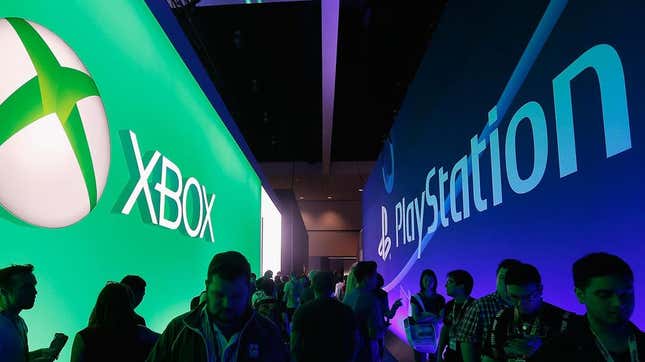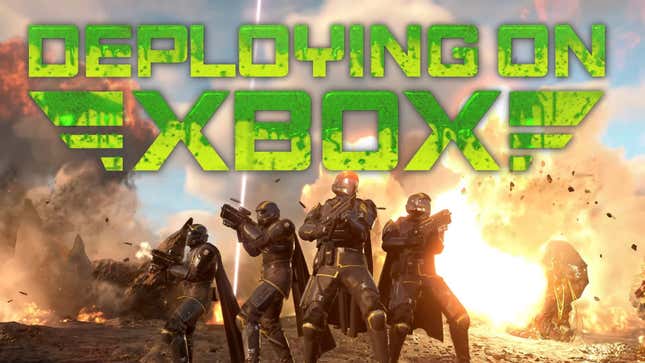
The start of the PlayStation 5 and Xbox Series X/S generation felt like a surprisingly old-school return to the console war rhetoric of yesteryear. Fans compared the numbers of teraflops, and both console makers shelled out hundreds of millions to lock down exclusive games for their new devices. New Final Fantasy games were only PS5, while Microsoft took multiplatform games from its Bethesda acquisition and made them Xbox and PC-only releases. We’re halfway through now, though, and things feel dramatically different. Console exclusivity might not be dead, but it certainly appears to be in retreat.
The latest death knell for console gatekeeping came last Friday by way of a surprising new job listing on Sony’s website. The company is hiring for a senior director of multiplatform and account management, which is a fancy way of saying someone who will help Sony profit from bringing its games to more storefronts. This person will be in charge of “global commercial strategy for PlayStation Studios software titles across all digital platforms beyond PlayStation hardware, including Steam, Epic Games Store, Xbox, Nintendo, and mobile.”
Fans are already treating this as a window into Sony’s thinking moving forward, including the possibility of it bringing more of its own first-party exclusives to other platforms, something that seemed unthinkable even just a few months ago. The job listing for the multiplatform leadership role goes on to say, “Oversee the out-of-year (mid-range) commercial strategy for PlayStation Studios titles across all non-PlayStation platforms, driving long-term revenue growth and audience reach.” It also lists direct reports that include people overseeing sales on both Xbox & PC.
Sony’s multiplatform approach began small with bringing big single-player exclusives like Horizon Zero Dawn and Days Gone to PC years after they were out on console. MLB: The Show is also on Xbox Series X/S and Switch, though it’s published by MLB on those platforms. Upcoming Bungie shooter Marathon is also multiplatform. Then last fall, Sony announced the Horizon Lego spin-off, Lego Horizon Adventures, for both PS5 and Switch. And just this month, Sony revealed it will publish Helldivers 2 on Xbox Series X/S. The new job listing, however, suggests things won’t stop there, and that this may be a reaction to more than just Microsoft bailing on the hardware race.
The tech giant has been on an accelerated course due to the struggling sales of Xbox this generation. Its multiplatform strategy began with reversing course on taking games exclusive and announcing ports of Grounded, Sea of Thieves, Hi-Fi Rush, and Pentiment as trial balloons to test the response from prospective players on PS5 and Nintendo Switch. A year later, Forza Horizon 5 has made the jump, and Gears of War: Reloaded will bring the Locust-chain-sawing shooter franchise to Sony’s platform almost 20 years after it became synonymous with Xbox. What’s more, monthly sales charts show these ported exclusives, including Indiana Jones and the Great Circle, are selling great on its long-time rival’s platform.
One way to view rumblings that Sony will look to bring more of its games to other platforms is as a direct reaction to Microsoft essentially throwing in the towel on exclusivity. But ballooning blockbuster development budgets and stagnating console sales—PS5 isn’t surging past PS4, thanks to lost ground by Xbox—suggests Sony is looking for more ways to profit off its games regardless of what competitors do. Helldivers 2 makes it easy to draw the current line at just multiplayer live service games, but if Sony really does see Xbox as becoming indistinguishable from a gaming PC in the future (complete with access to Steam), it’s not hard to see it replicating its single-player blockbuster strategy on Xbox as well.

Spider-Man is seven years old at this point. Bringing it to Xbox and Switch 2 for another few million sales would certainly be one way to squeeze more profit out of PlayStation Studios while doing negligible damage to PS5 console momentum. Sony has made no secret about wanting to raise margins of its game-making business in recent years, and leaked data from the malicious Insomniac Games hack offered a window into just how hard that can be with longer development times and IPs hitched to brutal licensing fees.
These are all theoretical financial justifications for a future gaming landscape with fewer exclusives — outside of the reality distortion field forever surrounding Nintendo, at least. But another might simply be that people don’t buy consoles that way anymore. “People who buy a hardware system these days, they’re doing it because of the ecosystem, because of their friends list,” Circna gaming research director Mat Piscatella told The Game Business last week. “You’re not going to get people to transition consoles because of exclusives anymore. We’re way beyond that point.”
It was a version of what Phil Spencer admitted in 2023 at what now appears to have been an important inflection point for Xbox. “There is no world where Starfield is an 11/10 and people start selling their PS5s,” he told the Kinda Funny podcast at the time. “That’s not going to happen.” He went on to say that many players are locked into wherever their digital libraries are now, calling the Xbox One/PS4 battle the “worst generation” to lose from the perspective of fighting over market share.
I’ve been skeptical of this view and think it undercounts Microsoft’s persistent struggle to consistently ship high-quality exclusive games that everyone wants to play. But it also seems undeniable that players, especially younger ones, are less attached to where they play games than ever as long as they can play what they want. Does this mean we’ll see God of War Ragnarök on Xbox Series X/S next year? Almost certainly not. But exclusivity increasingly feels less like a promise binding all Sony first-party games, and more like a ticking clock competing platforms bake into their long-tail sales strategy.
.